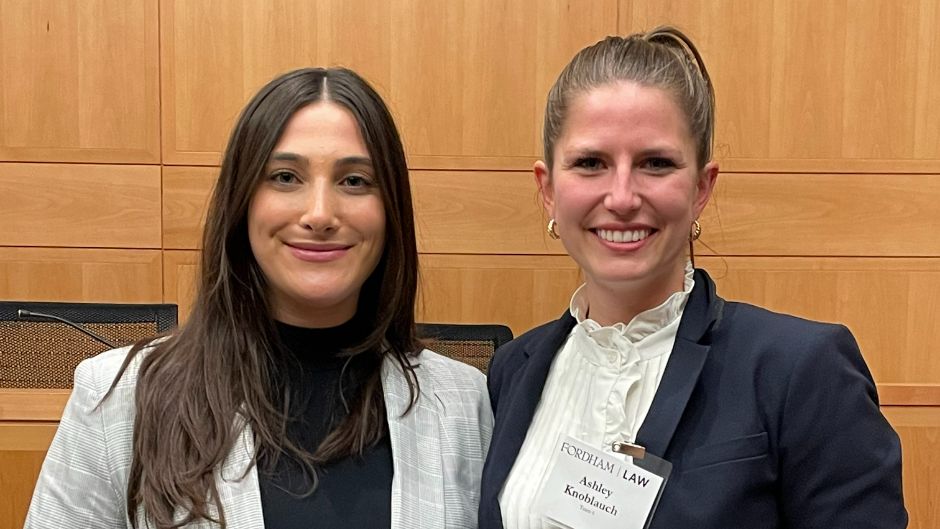In the 2024 Irving R. Kaufman Memorial Securities Law Moot Court Competition, Miami Law's moot court team, consisting of third-year law student Ashley Knoblauch and second-year student Sydney Stark, emerged as the winners. The team's exceptional performance earned them the top spot and the second-best respondent brief. Additionally, Knoblauch was recognized as the Best Oralist of the competition, making it the second year in a row that the University of Miami has achieved this prestigious honor. The team outshone 21 other teams and emerged victorious in the final round against UC Law San Francisco.
"I felt overjoyed and full of gratitude," said Knoblauch about winning the competition. "It was a true honor to argue in the final round, before three district court judges, and winning provided such affirmation of all the hard work that Sydney and I invested into the competition. Throughout the weekend, I truly enjoyed each oral argument, and every opportunity to answer judges' questions and craft responses. After hours of practice and research, it was fulfilling to execute, and I am so grateful to our coaches for helping us prepare."
The Irving R. Kaufman Memorial Securities Law Moot Court Competition is held in honor of the late Irving R. Kaufman, a Fordham College and Fordham Law alumnus and former Chief Judge of the United States Court of Appeals for the Second Circuit. The Honorable Katherine M. Menendez, the Honorable Colleen McMahon, and the Honorable Denise Cote judged the final round of this year's competition.
Justin Prociv, J.D. '03, and Joshua Williams, J.D. '16, coached Miami Law's team. As a student, Williams won the Kaufman Moot competition in 2016 and was honored to argue in front of Justice Samuel Alito of the United States Supreme Court. Prociv also coached the team that won in 2014.
The team worked on their brief over three-and-a-half weeks, followed by another two-and-a-half weeks to prepare for the oral argument.
"To ensure we stayed on track with our research and writing, we established a structured schedule for the brief's development," said Stark. "Each day, we dedicated extensive hours to researching, writing, and refining our arguments. Transitioning from the brief to oral argument, our exceptional coaches facilitated approximately 10 practice sessions. These sessions were enriched by the participation of UM Law alumni and current members of the Moot Court Board, who generously contributed their insights and expertise. Furthermore, we had the privilege of consulting with seasoned practitioners specializing in appellate advocacy, who offered invaluable tips and constructive feedback during our practice sessions."
"Winning the competition was an indescribable feeling," said Stark. "I felt a mix of happiness and gratitude. Knowing that our efforts had paid off and that we had achieved something significant filled me with a sense of pride and accomplishment. It was a moment I'll always cherish."
Read about Miami Law's moot court programs.

